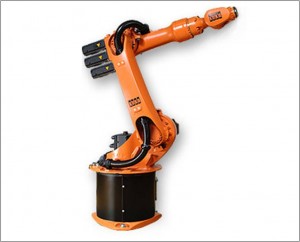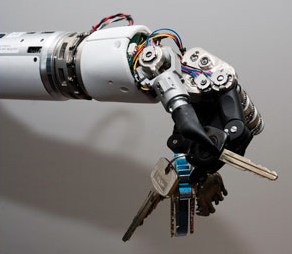or Mechatronic Engineering, humourously (but incorrectly) referred to as Megatronics at times. In Afrikaans Megatronika or Megatroniese Ingenieurswese. What is it? What can you do with it? When I started studying I didn’t know, after 5 years I think I have a vague idea. So below I’m going to post what I know.
In it’s simplest form it’s a combination of Mechanical and Electronic Engineering. If I really don’t feel like explaining, I simplify it to robotics. This is certainly a large portion of Mechatronics, but by no means a limiting factor.
Mechatronics as a named profession is fairly new, but the idea has always been there. In the South African context, UCT have had an accredited BSc (Eng) Mechatronics course since 1997 (although how long it has actually been running is uncertain), NMMU a BEng since 2007 (first graduates) and Stellenbosch since 2005 [1]. Potchefstroom University (NWU) are apparently aiming to start a course in the next few years [2]. Although not offered in the BEng format, UKZN do offer Masters through their Mechatronics and Robotic Research Group [3]. [EDIT: added list of BTech degrees and Diplomas offered at the bottom of the post]
Mechatronics at Stellenbosch [2]
I completed my BEng Mechatronics at Stellenbosch University in 2011. The Mechatronics course was presented by the Department of Mechanical and Mechatronic Engineering in a four year course. The first two years were identical to that of those studying towards a BEng Mechanical. The first year course is identical for all engineering students. In the third and fourth years, the two courses still followed similar routes, with the Mechatronics course replacing several Mechanical courses with some courses presented by the Department of Electronic and Electrical Engineering. In third year these included Electronics and Computer System’s courses and fourth year Electronics and Electronic Design Courses. Losing out on some Strength of Materials and Thermo-Fluid Mechanics.
The department put it this way [6]
The most important difference between the mechanical engineering programme and the mechatronic programme is that mechanical engineers are equipped to develop mechatronic systems with existing controllers (computers, PLC’s, etc.), while mechatronic engineers are also equipped to develop specialised controllers (e.g. for embedded controllers) and the relevant electronics themselves.
At the time, the Head of Department felt that Mechatronics as an entity was still too new. Employers weren’t advertising for Mechatronic Engineers, and didn’t really know what to do with them when they did get them. This resulted in the close ties between the Mechanical and Mechatronic courses. I was often unhappy about this, having would of preferred more focus on the Electronics, but in the end it worked out. And the HoD’s opinions were/are valid.
When I chose Mechatronics, I didn’t know where I was going to work, I chose the course because it sounded interesting. It wasn’t until my final year that I found a direction to work towards. Course setups at different universities are going to be different, and will put emphasis on different subjects, that doesn’t necessarily make one better than the other. Either way you’re going to come out of it with a degree and a fair amount of knowledge. Most importantly though (and this is true for any engineering degree) is you’ll know how to learn.
I’m quite confident that specific things that I learn in my first year of work will be of more value to my career than a specific subject at varsity, but having struggled through several subjects, I know I can figure out most things that come my way. I know where to look and how to go about solving problems.
In my final year we were a class of 85 Mechanical/Mechatronic students, of which I’d say about 30-35 received their BEng Mechatronics in 2011.
Mechatronics at NMMU [2]
NMMU have a slightly different setup. Mechatronics is presented by the Mechatronics school of the Department of Engineering, the Built Environment and IT. Mechatronics is the only Engineering degree they offer. As such, first year physics and maths are taken alongside BSc students and after the first year, courses taken are aimed only at Mechatronics students. The format of the course is still identical to that of when it started giving a good balance of subjects. The University also offers an array of BTech degrees in other Engineering fields.
I’m currently pursuing my master’s degree at NMMU. Their 4th year BEng Mechatronics class has roughly 25 students in it and the 3rd year class about 30. First year applications are limited to 60, with the most recent 1st year class starting with 50 students. The Mechatronics department is currently sponsored by General Motors South Africa (who have a plant in PE) and also have close ties to the Volkswagen plant in Uitenhage.
Mechatronics in General
Mechatronics as a career is still finding its feet. Meaning many consider it a jack of all trades, master of none type of situation, and although the course may feel that way, it’s certainly not the end of the story.
Mechatronics isn’t a new field, it’s just finally been given a name. When you tell people you’re a Mechatronic Engineer they don’t know what that is. I had a month stint at a large production facility as part of vacation training and I was asked to choose between focusing on their Mechanical or Electrical divisions, eventually settling for a bit of time at each. But that’s how businesses in SA are structured. This will change.
Several Mechatronic Engineers that I know have taken up Automation maintenance posts. Nothing wrong with this, personally it’s not where I want to be. Contrary to this though, my first job next year will be in automation maintenance. I however plan to use this as a stepping stone into a design career.
Automation is fun, and whereas I am going into automation in a production sense, automation also relates to smaller and/or more technical situations. The recent landing of the Curiosity rover on Mars is a perfect example of Mechatronic systems. There are several elements here, from the automated landing system to the remote control of the device.
In the motor industry, systems such as traction control, ABS and ESP are all examples of Mechatronic systems. Heavily complicated systems that rely on the processing of data from sensors to enable control of actuators. As such a Mechatronic Engineer can make him/herself home in many different industries. These include the Automotive, Aerospace, Manufacturing, Medical and Communications Industries.
Mechatronic Engineers can register with ECSA to become Professional Engineers [4]. The industry is governed by the South African Institute for Mechanical Engineers. I don’t see Mechatronics separating from this tree any time soon. The degree, being accredited by ECSA also means that the degree will be recognised internationally in many countries thanks to the Washington, Sydney and Dublin Accords [5]
So what do you do when you have your degree? You do whatever you want. You’ll find something. I’m not aware of any of my colleagues who are currently not pursuing a post-graduate degree or are employed. Not all of them are in Mechatronic specific posts. Some have opted for more mechanical orientated jobs, while others have gone entirely into areas such as electronic design or programming. And that’s one thing, a degree in Mechatronic Engineering in no way limits you. Very few engineering degrees will actually.
After re-reading what I’ve written, I think I’ve put forward some information relating to Mechatronic Engineering, but it’s still left fairly vague, maybe it’s just because none of us know what we’re really doing :)
A National Diploma in Mechatronics (for registration as a Professional Engineering Technician) can also be had from the following institutions [7]:
- Tshwane University of Technology
- UNISA
- Cape Peninsula University of Technology
A BTech in Mechatronics (for registration as a Professional Engineering Technologist) from [8]:
- Tshwane University of Technology
- UNISA
- Cape Peninsula University of Technology
and to reiterate, a BEng, or BScEng (for registration as a Professional Engineer) [1]:
- Stellenbosch University
- University of Cape Town
- Nelson Mandela Metropolitan University
Note: Although other institutions may offer courses in Mechatronics, or Mechanical Engineering with a focus on Mechatronic elements, the ones listed above are the only ones recognised by ECSA for registration as a mechatronic professional. Information was correct at time of posting, but may have changed since.
There are also several Universities of Technology and FET Colleges which offer courses in Mechatronics. CPUT is one of these institutions. Another training institution is Umbilo Training Specialists in Durban. They are running a free training course, once a month where anyone can come to learn more and expand their knowledge. Checkout their page for details.
For some more reading and a very complimentary view with some poignant remarks have a read here.
As part of my degree at Stellenbosch University I completed a project which can be seen here.
As part of my master’s degree at NMMU I completed a project which can be seen here and here.
If you’re looking for bursaries, try this website.
If you have any questions, feel free to ask in the comments section.
- [1] ECSA – Accredited Universities
- [2] Much of what is stated comes from my own experiences and conversations with relevant people.
- [3] UKZN – Mechatronics and Robotics
- [4] ECSA – Registration
- [5] ECSA – Recognised Qualifications
- [6] Stellenbosch University – Mechatronic Engineering
- [7] ECSA – Accredited Diplomas
- [8] ECSA – Accredited BTech





Very interesting info.
Will look forward to my studies.
Hi. My friends and I are in Grade 11 and we have to job shadow the career fields that we would like to work in one day. We are interested in mechatronics but more of the robotic side of it ,do you perhaps know of any places/companies in Cape Town that would allow us to do so?
Hey Liami
I don’t know of any companies specifically. I think most companies would allow you to do it, it’s just getting hold of the right person.
Try KLAZ robotics, main line of work is not robotics, but think they do some side work. Seems like the kind of people who’d be open to job shadowing.
Sea Technology Services also look pretty cool.
Hi Gareth, its Errol I once asked you about whether its possible to make a company as stark industries and you said or typed that it depends on a lot of external factors, what factors do you really mean?
Hey, I assume this is the comment you’re referring to.
External factors mainly relate to the world around you, that which you don’t have control over. How other companies develop to compete with you. What technologies come forward, and what your company does to keep up to date, or advance.
Depending on what industry you want to enter into, you need to be aware of what is happening in the world, what technologies are being developed, and what people are taking to.
I belive you are true, and thanks for the blog I nowam looking forward to becoming a mechatronic engineer and just wondering, who do you consider to be the best engineer or scientist(one you look up to)?
I’m an odd person, I don’t really have role models, or they mostly tend to be people I know personally who I respect. But anyone using their skills to not only further science and engineering but being able to make an impact in people’s lives gets my thumbs up. Good luck!
Gareth good day to you sir, it has been a pleasure blogging with you I have found that UCT offers Mechatronics under Electrical engineering while stellenbosch offers it under Mechanical engineering so which do you think is the best regardless of that I like UCT but I want to do it under Mechanical engineering
I haven’t done the course at UCT so I can’t say. Both are good courses. Still Bosch has stronger mechanical focus. UCT electronic.
Good day Gareth
I am desperately trying to arrange vacation employment for my son who is doing BSc (Eng) Mechatronics at UCT. He is in his 1st year. As you know they must do vac work BUT it is incredibly difficult to find a job that will benefit him in his studies. Can you perhaps help by sending me some company names / contact details? It would be really appreciated.
Regards
Charles
Hi Charles, it’s quite difficult getting vac jobs, I had problems myself. Being in 1st year makes it even harder, as one hasn’t learnt that much by then.
I don’t have any contacts specifically, you can have a look at my reply to this post for some potential places.
hi Gareth am currently doing my second year BSc (Eng) Mechatronics at UCT,
i know that UCT has a vac work that it provides for students who are struggling to find one. Every year the department of Mechanical engineering takes about 120 students who are suppose to complete their EEE1000X course to CPUT to do their vac work for 3 weeks which covers the six weeks vac work. The post is already out.
Thanks for the info Vuyani!
Hi Gareth
Thanks for the response..he is doing a 2 week stint at CPUT & I will contact the 2 companies you mentioned in the post.
Kind regards
Charles
Hi, thanks for taking the time to put up this valuable and seemingly scarce info.
How have things developed since the writing of this article?
Also, how do the Diplomas, BTech’s, and degrees differ in what they practically give you?
Thanks
Hey Walter. What do you mean by how have things developed? I wouldn’t say the industry has changed much since I wrote the article besides maybe a better awareness of mechatronics as a standalone subject.
With regards to different certifications, BEng is a 4 year University course. Relatively theory focused with some practical requirements. Diploma is more practical with 2 semesters of required practical experience. A BTech is usually achieved by doing a theory based honours year on top of a diploma.
Hi, thanks for the reply, and the info already given. I missed your reply unfortunately, only seeing it now.
What I’m interested in knowing about how things have changed since the article, is in terms of the courses offered in South Africa. Have any more good options arisen, or have there perhaps been developments in what the mentioned institutions offer?
The other part of my question was really to find out how one should view the different qualifications. What does having a BEng give you that a BTech doesn’t, and a BTech that a Diploma doesn’t, in Mechatronics? Does having a diploma mean I can be employed to work in Mechatronics, but not have my own practice/firm? What about BTech? Could I be trusted to do anything good or important (e.g. Automotive Safety, Medical Instruments) in the industry if I have anything less than a BEng?
Hi Walter,
I’m not too sure, as I’ve started working I’ve had less and friends still active in the academic side. I don’t know of any major changes to the courses.
This is always a contentious issue, in general people will say that BEng > BTech > Dipl. But many people have different experiences from people with different skills which impacts the value they put on the different degrees. A BEng is a 4 year university (mainly theory) degree. A Diploma is a 3 year course which includes a min of (I think) 6 months practical experience/internship. That is a requirement to get your Diploma. A BTech is like an honours year for Diploma engineers where they work on a project and write up a mini-thesis, like a BEng student. So BTech/Dip engineers have more experience going into a job than a BEng.
From a professional point of view, most businesses in SA won’t be too phased if you have a BEng/BTech, but some with a diploma is more likely to be employed doing handson technician work. I believe the majority of SA Engineers do not register as Professional Engineers/Technologists/Technicians, there are advantages to being registered, and is does have weight behind it in certain situations. But many engineers operate in industries where there is no requirement for professional registration.
Thanks for the info, very helpful info, not easy to find online.
Happy new guys…Gareth I have an average of 55% in my honours degree in Mechatronics but really want to do e MEng Mechatronics at nmmu in 2016…is it possible to secure e place with such a low average
Hi Denzel. It is possible, but could be a little bit difficult, as supervisors might be a bit concerned by it.
You will need to show that you are up for the challenge of a masters degree. Get in contact with supervisors at NMMU and discuss with them that you want to do a masters but your marks are a little low.
Also speak to any professors at your own University who might be willing to write a motivational letter or who may have contacts at NMMU that they can talk to.
hi…my son is intrested in mechatronics and his matric subjects were maths lit(level4),computer applications technology(level5),business studies(level4) and he got a “B” in overall for admission requirements will he qualify if he didn’t do science?,or must he got to FET college and do the 3years ncv before going to the university pls help i need advice
I’ll be surprised if he can get in at a university without science, and only maths lit. The only way you will know for sure though is to contact the institution he wants to study at directly, or check their websites for more info. Not all institutions have the same requirements.
Hi, I have been accepted at UCT for mechatronics 1st year. I really want to do it. However I did not do IT or any computer subjects in high school. Will that be a problem for me? If so what do you recommend?
Hi Kegomoditswe
Have you got experience using a computer? Having done IT is not a requirement and many people do fine in the programming courses at university without previous knowledge. If you haven’t had much general computer experience previously I advice looking for extra lessons, and when you take your programming courses, see how well it goes. The biggest thing to note is that if you are struggling, ask for help.
hello
i hear your accepted at UCT for mechatronic engineering congrats. i’m currently doing grade 11 and i was hoping you could give me the average percentage you got or the ones needed to get accepted in the course
Hi Gareth
I finished my BTech in Information Technology in the Programming field and also worked for a few years in the field. I’m thinking about doing Mechatronics through UNISA but I’m not sure if I’m making the right choice here. Mechatronics was my first choice when i started studying but people told me to rather go into IT reason being the field is more popular and getting a job should be easy which it was, this was back in 2010. Do you think UNISA’s program is good enough to also pursue a job overseas?
UNISA offers a BTech which will be recognised by the Sydney Accord, and as such accepted by several 1st world countries as a relevant qualification.